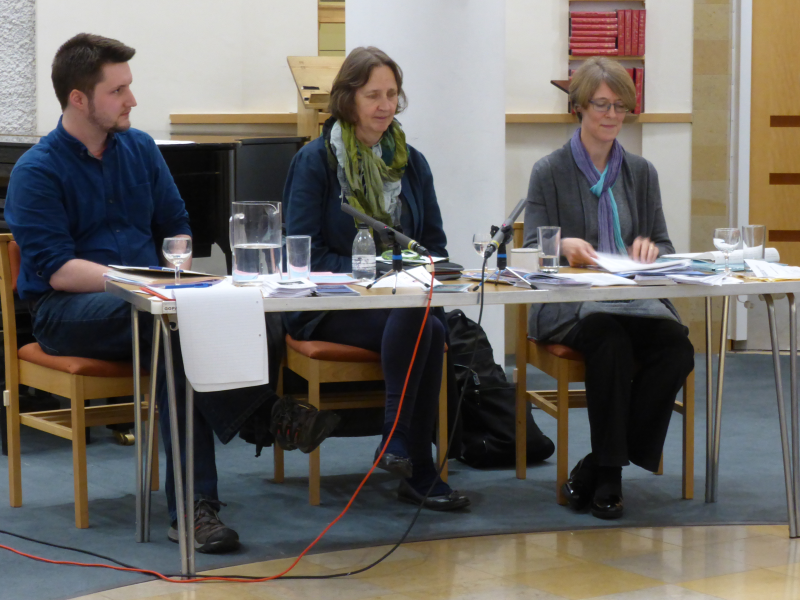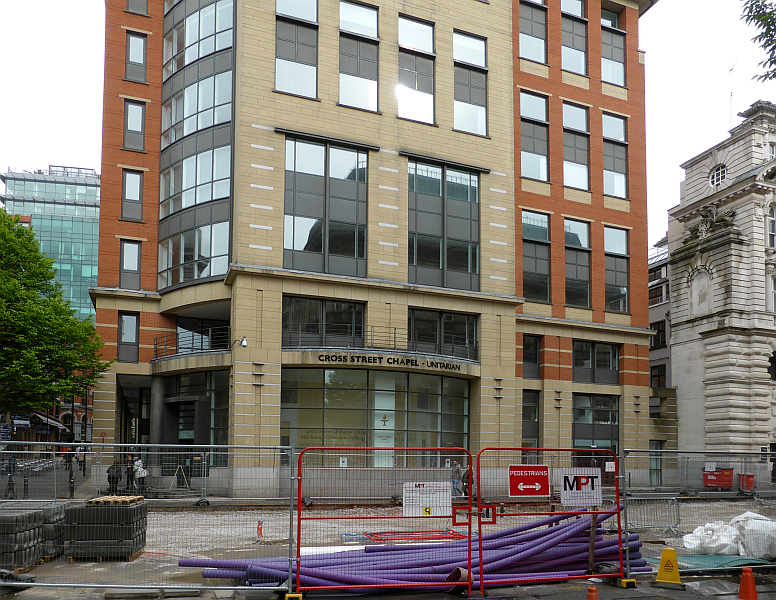
A panel met to end the Theology Conference on 21 May 2016 located at Cross Street Unitarian Church in Manchester. It consisted of the Reverends Lewis Connolly, Sarah Tinker and Sheena Gabriel.

For the Rev. Sarah Tinker theology is not her favourite but she appreciated such days and this get-together. She was keen to hear more and saw the value of dialogue. After all, her own way into Unitarianism was through Building Your Own Theology, and she stressed the 'ing'.
The Rev. Sheena Gabriel, by contrast, loves theology, but she further said that theology had got a bad press in the movement. She noted that there are different definitions of theology. She dislikes Karl Barth's (1886-1968) theology but noted his definition of the landscape of awe and stories of the divine. ("Faith is awe in the presence of the divine incognito" is the often seen quote from Barth, K. (1969), The Epistle to the Romans, Oxford: Oxford University Press, page 39; I am surprised if he used the word 'landscape'.) She noted how it has been said that God lives as poetry while theologians gather dust, but she wants theology to move forward and says yes to Iris Murdoch's question whether all religious people now should become mystics.
Now the Rev. Lewis Connolly was introduced as being formerly and Anglican (deacon and priest) and married to an Anglican priest in training and that he was interested in non-realist theology.
This reminded me of during my year at Unitarian College, but at the General Assembly. A group of Northern Irish ministers came along, probably sniffing around for potential recruits. I gave them an account of my interest in Don Cupitt and non-realist Christianity. It was enough to see them go away. This was at a time when Don Cupitt was an active Anglican priest as Dean of Emmanuel College, Cambridge. He has since said that his critics were correct all along, and he has withdrawn from all forms of Anglican ministry and indeed taking Holy Communion. And of course I was using James Martineau in my 'Chain of Memory' question as a cause of liberal postmodernism, by the subjective crashing into and undermining the objective, and leading to flux.
A sound file is made that introduces him, gives his assessment and includes my question and his answer. I noted that he answered my question straight away, rather than gather a selection of questions.
For Lews Connolly the Theology Conference was his kind of day. The question of Unitarian identity kept coming back. How can we speak of Unitarian identity and if we cannot then how can we do a shared systematic theology? He agrees with Stephen Lingwood that Unitarianism is not a blank space but rather truth is contextualised in space and time in the churches and chapels we come from and in the times we meet; Unitarianism as a catch-all identity is highly problematic. Theology in our contexts enriches the spiritual life, and must stand up as an authentic alternative to orthodox Christianity creating an internally robust liberal religious space. His only identity he is comfortable with and wishes to get behind is the Jo James's egalitarian, immanent spirit and then how to build policy and how any systematic theology can be built upon it. So it is about subjective quality in spaces rather than something to be put on paper. In the day we journeyed with each other, he said, and raised the quality of theological discourse and he looks forward to more.
So I asked about non-realism and Unitarianism. I'd made my earlier Karl Barth to postliberalism, Martineau to liberal postmodernism paths; yet the Unitarian tradition has been one of simplification of Christianity, make it pure, find the essence, get the kernel, what is left of objectivity - and it is very difficult to be non-realist when you don't have a given symbolic tradition that you are undermining but keeping all the time. Now he is ex-Anglican, so might understand this: that you give a fixed liturgy non-realist interpretations quite easily because it is a kind of a nonsense even if a spiritual nonsense, but when you say what you mean and mean what you say it is quite difficult to be non-realist, isn't it.
Yeah, he said. It's an onward problem with the use of religious language in our movement, he continued, where we have the problem that it is unclear to the uninitiated what we mean in the language that we use. He said that we throw around a word like God, or we say the Lord's Prayer together. Indeed, he says the Lord's Prayer from a non-realist or Altizerian perspective that the objective God or God up there has either never existed or is dead. It can be helpful to step back and just unpack that for people so that they realise that there is a thick depth of metaphor that we use on Sunday mornings and that can invite people into these types of spiritual conversations that otherwise they can feel quite alienated from them.
(Thomas Altizer's (1927 -) theology can be confusing because one never knows whether he means that God really did die on the cross, in a highly realist sense, or that it is all metaphor, and then we have it as non-realism and then underlines even more by 'absence' the non-realism. God's death began with creation and ended with Christ on the Cross. His views fit with Gabriel Vahanian (who I put in my thesis for his use of Waiting for Godot, that the Holy Land has turned into a vacant gooey lovely memory), William Hamilton, Paul Van Buren, and Rabbi Richard Rubenstein. The line here is Barth and Bonhoeffer, of The Secular City (Harvey Cox, at that time - 1966), of people too busy to ask ultimate questions, of a transcendent but lost, secret, silent or possibly dead God. Yet, surprisingly, even confusingly, Altizer is for the immanence of Spirit, and for getting on within this world: as such he is highly anti-Platonist. He sounds relevant to the Theology Conference day.)
Nicky Jenkins said she is so so about theology but did read John Spong and Marcus Borg and came into Unitarianism this way. There are different theologies, and what about pastoral theology? The answer was that it is presumably related to psychology. I was surprised by this answer because I thought it was contextual theology by another name, in other words what happens in congregations and in the daily lives of the people. It becomes an observation of daily struggles and then a reference back into the tradition for understanding and guidance. Lewis Connolly referred to practical theology (similar!) and rejected talk like "shepherd and sheep" and patriarchal narratives in favour of more egalitarian ones.
One questioner said look to physics to explain the cosmos and use that, any theology then follows on. I have much sympathy with this view, although the theology can get complex: we have chaos theory and then systems, we have virtual numbers and shapes in fractals - the beauty of equations suggests transcendence.
A questioner point was made that other denominations have liberal wings and how distinctive are Unitarians in comparison? The answer was in the stress on the here and now, and not beyond or next, and the unfolding nature of truth. Quakers and some 'mainstream' might agree.
Theology, said another, ought to be more psychotherapy based, far more atuned to who we are and our needs.We should not be afraid to express our provisional beliefs.
Sarah Tinker thought we can build communities where dialogue happens including in these places where people give personal testimony regarding their journey in faith.
Lewis Connolly thought that contextualising our own personal theology is only valuable as it relates to good fruits. We are not so cutting edge, we should read the academic material. There is a failure of the 'chain of memory'. We need to link up again with the art of telling divine stories and to tell some more.

Well that was the conference, and of course there were private conversations. I was invited by Jo James to look at his book there and then referring to the Collegiants giving up the Spirit. I talked about Altizer with Lewis Connolly. I spoke about congregational matters with John Clifford and one or two others, and about what I might be doing. I had a brief chat about postmodernity with Stephen Lingwood. I talked about long ministerial shadows too. Jim Corrigall recognised me and had named me despite never having met me.
So what did I think of the conference, one I might have deliberately missed because I feared it had an agenda of prescription?
Someone had said it was far better and purposeful than going to a General Assembly. I bet that is so - simple answer there is to hold a theology day at the General Assembly and make either and both accessible for individuals. It was definitely positive.
I am dismissive about the usefulness of the David Steers presentation, even if I recognise some of what he laments. It is not where we are at and had nothing to offer but museum curating. Its title was misleading.
Stephen Lingwood's presentation did have more to offer, and he did arrive at theological identifiers. These were successfully developed by Jo James, historically and theologically. Something niggles but I am more positive about it than perhaps I ought to be. Maybe the background support is selective, but it was well selected and argued. Perhaps I am biased, given my background, but I think Melanie Prideaux offered more tools to the job and had more to say, although the anthropology didn't become a theology beyond the possibility: not described. It becomes, of course, a pastoral and a practical theology, and what else can be extracted. But what does it sound like when laid out? In this field a (for example) University of Chester course might (might!) ask, for example: how does what you observe relate to the life and work, the preaching, healing and eschatology, the incarnation and resurrection, of Jesus Christ? Well, Unitarians would not answer like that. Experience cannot be related to such a given theological base. It almost has to be an inductive theology, that is theology from below, like inductive anthropology or inductive history. It has to be about the secular and the sacred, the plural and the personal, the descriptive turned into a narrative of beliefs classified - as carried out in Kendal by Woodhead and Heelas (see Review 3).
It was on the conservative side, this conference, and simply didn't go into the pluralistic, postmodern world of difference. It didn't touch any creative, cutting-edge theologies that Unitarians might reapply. There is always another year. But it was a good launch and got the show on the road, and this must be a good thing. It is more a good thing that late in its life the Unitarian stream still has something to say about its own path. If it ends sooner or later it will do so with an active memory, even if it is selected and a little invented. The chain might get restored, even if the end of it arrives.
Adrian Worsfold
Pluralist - Liberal and Thoughtful